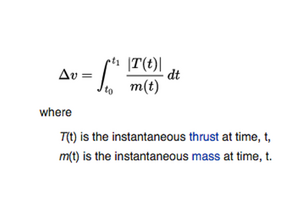
Physics
Delta-v (literally "change in velocity"), symbolised as ∆v and pronounced delta-vee, as used in spacecraft flight dynamics, is a measure of the impulse that is needed to perform a maneuver such as launch from, or landing on a planet or moon, or in-space orbital maneuver. It is a scalar that has the units of speed. As used in this context, it is not the same as the physical change in velocity of the vehicle. Delta-v is produced by reaction engines , such as rocket engines, and is proportional to the thrust per unit mass, and burn time, and is used to determine the mass of propellant required for the given maneuver through the Tsiolkovsky rocket equation . For multiple maneuvers, delta-v sums linearly. For interplanetary missions delta-v is often plotted on a porkchop plot which displays the required mission delta-v as a function of launch date